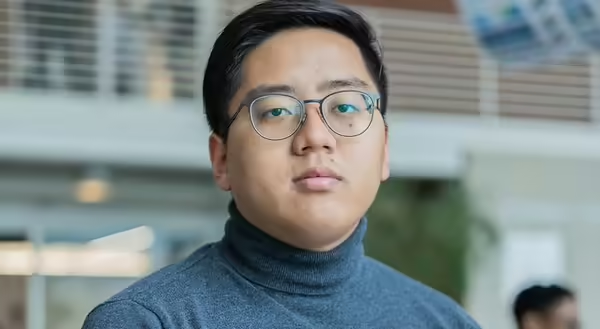
As an ISPP Scholar, Kaung Nyein is appointed with the Illinois Department of Commerce & Economic Opportunity, Office of Broadband. His work is significant as he focuses on digital equity as well as on how immigrant populations are impacted by lack of/or limitation of resources. Kaung shared some thoughts with me about the ISP program, and his work so far.
Why did you apply for the Illini Science Policy Program?
Illini Science Policy Program perfectly fits the gap year between my recent graduation in Masters of Urban Planning and my intention to embark on a second master’s degree the following year. This program is an extension of my academic pursuits, offering a timely and valuable experience that aligns with my interests in public service and my passion for community development. The program bridges my urban planning knowledge to the real-world policy challenges within Illinois This program is also a chance for me to contribute to the state of Illinois - a state I’ve grown to know extensively during both my undergraduate and graduate studies. It is a unique opportunity to enhance my professional skills set while giving back to the Illinois community.
Tell us a bit about what you hope to accomplish as a result of being a 2024 Scholar.
As the Office of Broadband is working on addressing the issues with digital equity, digital literacy, and broadband expansion and expanding the capacity and resources to communities, I hope to understand and be part of policy development and community development as a whole.
Tell us a bit about what you are working on for your host agency.
I have worked on several mapping projects including using FCC datasets to identify unserved and underserved locations. I am also reviewing several proposals for the Broadband READY grants. I am also assisting my other ISPP scholar in developing a digital literacy curriculum.
Tell us a bit about what you are working with your Extension Mentor (or what you will be doing)?
I will be working on a project where I focus on the impact of broadband connectivity on immigrant populations and factory workers. This emphasis of this project is primarily in West Central Region of Illinois.
What does being in public service mean to you?
Being in public service means that emphasis should be the significance of contributing to the betterment of society and the welfare of the community which means supporting community engagement, working towards equal and equitable opportunities and resources, and empowering marginalized communities.
What makes the work you are doing as an ISPP Scholar meaningful to you?
For the Office of Broadband my mapping and data visualization will contribute in determining the accuracy of the broadband infrastructure fabric layer. Accuracy is key as it will decide where the next infrastructure will be built and how much resources will be spent in a particular area.
For the Extension mentor project, I will be contributing back to the community I lived in during my undergraduate years. Additionally, as an immigrant to this country, I aim to study the impact of broadband, whether it may be positive or negative for immigrant populations and by providing broadband service to them if needed.
What is one thing that you have learned since becoming an ISPP Scholar that has made an impression on your transition from graduate student to career individual?
My academic career and UIUC and my previous experiences in public service and governments have prepared me. I also believe ISPP scholar will become an epitome of my future career path towards public policy.
Why is/are the issue(s) important to the communities with which you are working?
During and after the pandemic, we are seeing more and more of the digital divide among communities. The normalization of Work-from-home and the advancement of the technology with AI is reaching to another level, having high-speed and reliable broadband connectivity should be a right in our modern world. The accessibility and adoption of broadband should no longer be an issue as we prepare to embark on to the next level of technology.
Who is impacted by the issue(s) you are working on?
Everyone is impacted; youth, seniors, and people of disadvantaged backgrounds etc. It doesn’t matter whether you have digital literacy or not.
What is the most unexpected thing about this program so far?
The people you’ve met or will be meeting throughout this program. Colleagues, supervisors, communities and stakeholders all come from different backgrounds but having an exceptionally passionate with community development.
If you could do one thing through this program and think “Wow, I did that,” what would you like it to be?
I would love to visit and learn how the actual broadband/fiber-optic infrastructure are built, from digging up the ground to powering up the network.
Anything else you’d like to share?
I am super grateful of my supervisors Dr. Evangeline, Nancy Ouedraogo, and my colleagues from the host agency for making transition smooth and flexible. Highly encourage recent graduates who are interested in public service to apply.
More information about the Illini Science Policy Program is available on our website. Keep reading to learn more about Kaung's colleagues in the of 2024 ISPP Scholar Class.